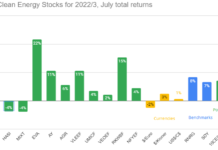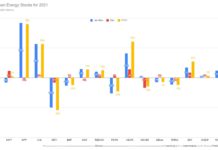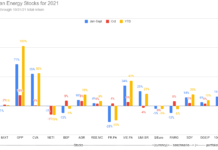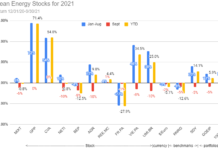Renewable energy is still very much in its infancy, which means that companies in the space are either profitless or high-multiple startups, or divisions of much larger companies (GE Wind (NYSE:GE), or utilities such as FPL Group (NYSE:FPL) and Xcel (NYSE:XEL) which get much of their power from conventional generation.) This presents a dilemma for investors who understand the compelling drivers for the sector, but whose risk tolerance or financial needs indicate an income-based investing strategy. Canadian Income Trusts in Renewable Energy A few Canadian Income Trusts have historically gone some way towards filling this niche. These include the Boralex Power income trust (BPT-UN.TO / BLXJF.PK), Algonquin Power (APF-UN.TO/AGQNF.PK), and the Clean Power Income Fund (CLE-UN.TO/CEANF.PK). The Boralex Power Income Fund owns an electricity generating asset mix of approximately 45% hydroelectric (by 2005 revenues), 32% wood residue (biomass) with some cogeneration, and 23% natural gas fired cogeneration. It is managed and 23% owned by its parent utility, Boralex (BLX.TO/BRLXF.PK). Algonquin Power Trust owns a mix of hydroelectric generation (25% of sales), cogeneration (42% of sales), Alternative fuels (9% of sales), and infrastructure (24% – mostly waste disposal and treatment. Percentages based on 2005 data.) Alternative fuels (mostly landfill gas, municipal solid waste, and some wind) comprise the fastest growing segment of the portfolio. Finally, the Clean Power Income Fund, which trumpets itself as “the first income fund to be certified under Canada’s Environmental ChoiceMProgram,” owns a mix of electricity generation assets consisting of landfill gas (37% based on 2005 cash flow), biomass (27%), hydropower (26%), and wind (10%). They are completing the Erie Shores 99MW wind project which will increase the wind portion of the portfolio. Disappearing Tax Advantages While none of these have the stability of a bond fund, they have gone some way towards bridging the gap between volatile startups and predictable income, allowing a broader spectrum of investors to participate in renewable energy. However, they were all organized to take advantage of a provision of Canada’s tax code which conferred significant tax advantages, similar to the advantages enjoyed by REITs and Master Limited Partnerships in the US. Those tax advantages were scheduled to be phased out over the next four years to the surprise of the financial markets in November, and while some are still fighting the tax law changes, the trust management of these three trusts have, by their actions acknowledged the reality of the changes. Within the last week, The Clean Power Income Fund board has agreed to be acquired by Algonquin Power, subject to the approval of its unitholders, while The Boralex Power Income Fund has announced that it is up for sale, possibly to be acquired by its parent, Boralex, which currently owns 23% of the fund and acts as its manager. Risks and Opportunities For the traditional income investor, primarily interested in stability, all this activity and the volatility is bad news, but it presents opportunities for the risk tolerant investor interested in purchasing solid, income producing assets, something of a rarity in retail renewable energy investing. It’s impossible to say what good price entry levels are for any of these funds, but they are all considerably cheaper than they were before the tax changes were announced in November. Prospective investors should also understand the tax implications (which depend not only on the changing laws, but on the nationality and tax status of the account used) before investing. Tom Konrad, Ph.D.is an independent investment adviser registered in the state of Colorado who helps people reach their investment goals while protecting the environment. DISCLOSURE: Tom Konrad and some of his clients hold positions in The Clean Power Income Trust and the Algonquin Power Trust. DISCLAIMER: The information and trades provided here are for informational purposes only and are not a solicitation to buy or sell any of these securities. Investing involves substantial risk and you should evaluate your own risk levels before you make any investment. Past results are not an indication of future performance. Please take the time to read the full disclaimer here.








sorry, I mean mpt.un.
since we’re on the subject, other Canadian alternative energy include:
Creststreet Power & Income Fund LP (CRS.UN)
Northland Power (not as green) NPI.UN
Macquarie Power and Infrastructure (the ones who bought Clean Power Income Fund) (MPT.UN)
Great Lakes (not as green – big hydro) GLH.UN